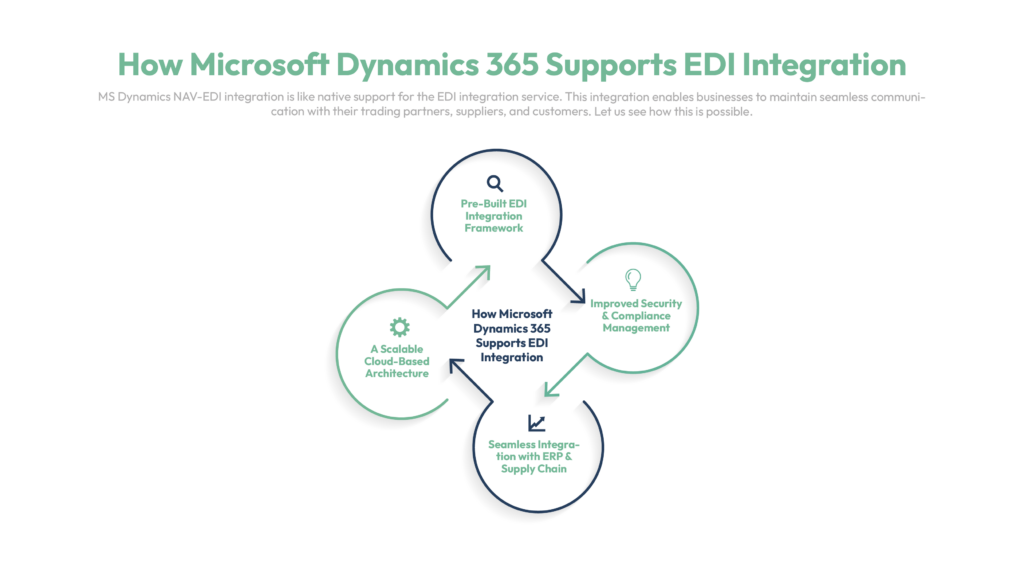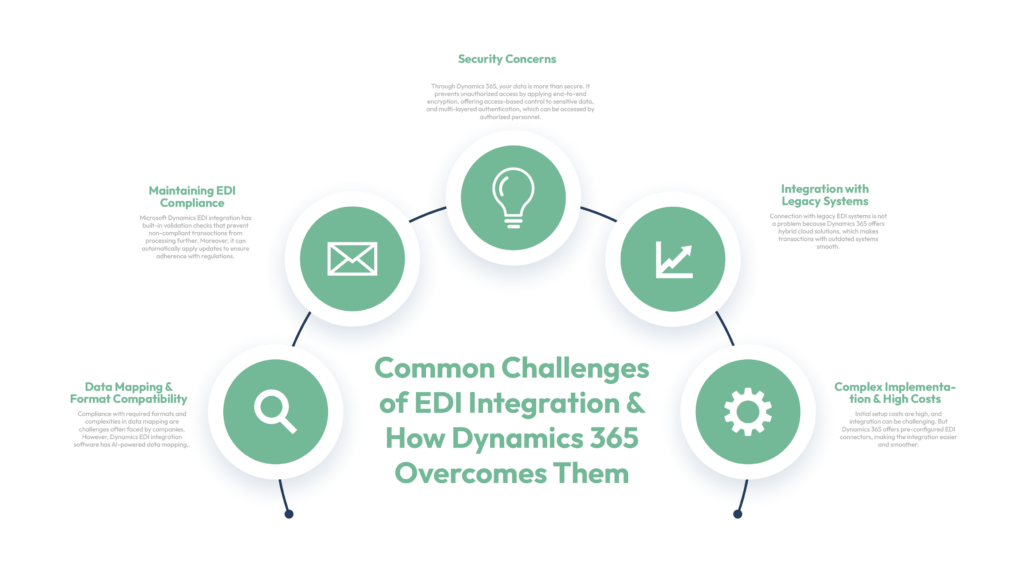In today’s world, data is the core of everything, so businesses need seamless exchange of data. EDI, a.k.a. Electronic Data Interchange, is the most critical component in modern-day B2B transactions. Dynamics EDI integration allows businesses to exchange business documents electronically. Hence, increasing the information transfer speed improves the accuracy and security.
But, due to complexities of data and workflow, compliance requirements, and compatibility issues with existing systems, many businesses struggle or completely ignore EDI integration software.
However, this does not have to be the case with your business! Microsoft Dynamics EDI integration provides you with a robust, scalable, and automated solution. Implementing Microsoft Dynamics 365 will not only streamline your operational processes but also improve security and ensure compliance.
Microsoft Dynamics EDI Integration refers to the process of connecting Microsoft Dynamics 365, which is a suite of business applications, with the Electronic Data Interchange (EDI) systems of your choice.
The integration process involves setting up a communication channel between Dynamics 365 and EDI systems. This enables them to exchange data and documents seamlessly, including purchase orders, invoices, shipping data, and more. This blog explores how Microsoft Dynamics 365 simplifies EDI integration, addressing key business challenges and why choosing Microsoft Dynamics will unlock operational efficiencies.
Understanding EDI and Its Role in Business
What is EDI?
Electronic Data Interchange, or simply called EDI, is the secure and automated exchange of business documents such as invoices and shipping notices between trading partners. EDI enables two computer systems to communicate rapidly without human intervention, making document exchange faster and operations smoother. EDI transactions are machine-readable, removing the need for manual entry or approvals and minimizing human errors.
Microsoft Dynamics EDI integration software makes integration seamless and data flow smoother, ensuring integrity and security. As a result, it helps enterprises streamline operations, improve communication, and automate processes, leading to accurate, cost-effective, and rapid transactions.
Why EDI is Essential for Modern Enterprises
Here is why your business needs EDI integration:
1. Eliminating manual processing
2. Accelerating transaction speeds and accuracy
3. Improving your supply chain efficiency
4. Ensuring regulatory and standard compliance
5. Minimizing operational costs and human errors
Through automation, you can eliminate manual processing, which will reduce error chances and improve accuracy. This will also accelerate order processing and invoicing. Thus, your supply chain speed and accuracy will improve with real-time tracking and workflow automation. EDI integration will also help follow and fulfill industry standards, ensuring secure data exchange. Finally, it will reduce administrative work and save budgets.
How Microsoft Dynamics 365 Supports EDI Integration
MS Dynamics NAV-EDI integration is like native support for the EDI integration service. This integration enables businesses to maintain seamless communication with their trading partners, suppliers, and customers. Let us see how this is possible.
1. Pre-Built EDI Integration Framework
Dynamics 365 comes with pre-configured EDI integration capabilities. These pre-built features allow streamlining connectivity with third-party EDI integration software and B2B transaction networks. The integration and communication run on the preconfigured connections, which ensure quick deployment. Moreover, they offer diverse compatibility with different industry standards like ANSI X12, EDIFACT, and PEPPOL.
2. A Scalable Cloud-Based Architecture
Unlike other ERP software and legacy ERP systems, Microsoft Dynamics 365 is based on a cloud-based infrastructure. This special feature enables Microsoft Dynamics solutions, in this case the EDI operations, to grow with business growth and demand. The cloud-based EDI integration processes data in real-time, ensures remote accessibility, and applies updates to follow compliance standards.
3. Seamless Integration with ERP & Supply Chain
With MS Dynamics NAV EDI integration, your business will not need anything else. EDI comes fully embedded with Microsoft Dynamics. This integration speeds up and simplifies processes such as inventory updates and tracking, order fulfillment and tracking, and automated order processing.
4. Improved Security & Compliance Management
Microsoft Dynamics EDI integration software improves compliance and security. It encrypts the data for safer processing and interchange, keeps trail records of data for audit purposes, and prevents unauthorized access. Following strict regulations for data exchange, like HIPAA in healthcare, ANSI X12 in retail, or GDPR, is difficult. But EDI integration ensures compliance, prevents penalties, and improves trust.
Key Benefits of EDI Integration with Microsoft Dynamics 365

1. Efficiency and Automation
Experience efficiency and improvement in business processes by implementing automation and removing manual data entry. Prevent human errors and delays, drive accuracy with AI-driven validation, and reduce mismatches or disputes. Set up workflows to speed up supply chain operations.
2. Supply Chain Visibility
Track, collaborate, and receive real-time updates and alerts easily with Dynamics 365 EDI integration. Enable yourself to track shipments and payments, communicate with vendors, customers, and suppliers seamlessly, and make better decisions.
3. Cost and Error Reduction
Microsoft Dynamics EDI integration software not only reduces business costs but also saves budget by preventing errors and mistakes from happening. First off, by automating operations, it prevents paper usage and administrative work. Preventing costly chargebacks that happen due to data duplication or inefficiency. And finally, it eliminates order delays and payment processing through automation and AI insights.
4. Seamless Integration for ERP & B2B
EDI integration can be done with the software system of your choice. Microsoft Dynamics NAV, Business Central, and Finance & Operations are great options depending on the business requirements and operational goals. Dynamics 365 offers seamless integration with many third-party EDI service providers along with supporting multiple trading formats and compliance standards.
5. Scalability and Flexibility
Every business wants to grow, but with growth come challenges like infrastructure costs, solution updates, and multilingual and currency support. But, if you choose Dynamics 365 EDI integration software, you would never have to worry about scalability and flexibility when it comes to growth and expansion. It can adapt to higher transaction volume and multilingual and multi-currency trades.
6. Business Relations Improvement
Improving relations with partners, customers, and suppliers has never been easier than now. Faster response time and real-time order status improve customer experience and product satisfaction. Moreover, the efficient exchange of documents fosters stronger collaboration with suppliers.
7. Faster Transaction Speeds
EDI transactions are faster and machine-readable, and the communication is directly between machines. This makes it faster, resulting in smooth and rapid processes like payment, order fulfillment, and other operations.
8. Enhanced Collaboration
EDI integration promotes seamless communication between parties. Regardless of the location and size of the data, the communication is always seamless and fast. This ensures the smooth operation of the supply chain and overall business operations, thereby boosting productivity.
Common Challenges of EDI Integration & How Dynamics 365 Overcomes Them

1. Complex Implementation & High Costs
Initial setup costs are high, and integration can be challenging. But Dynamics 365 offers pre-configured EDI connectors, making the integration easier and smoother. Moreover, the integration time is also reduced. Additionally, Microsoft Dynamics EDI integration offers pricing based on a subscription model, which makes it a cost-effective solution.
2. Data Mapping & Format Compatibility
Compliance with required formats and complexities in data mapping are challenges often faced by companies. However, Dynamics EDI integration software has AI-powered data mapping, which simplifies different EDI formats and supports multiple formats like ANSI X12, EDIFACT, XML, JSON, and more.
3. Maintaining EDI Compliance
Microsoft Dynamics EDI integration has built-in validation checks that prevent non-compliant transactions from processing further. Moreover, it can automatically apply updates to ensure adherence with regulations.
4. Security Concerns
Through Dynamics 365, your data is more than secure. It prevents unauthorized access by applying end-to-end encryption, offering access-based control to sensitive data, and multi-layered authentication, which can be accessed by authorized personnel.
5. Integration with Legacy Systems
Connection with legacy EDI systems is not a problem because Dynamics 365 offers hybrid cloud solutions, which makes transactions with outdated systems smooth. Moreover, custom API integrations will make the connection easier as well.
Methods of Microsoft Dynamics 365 EDI Integration
Opting for Microsoft Dynamics 365, you will have three main options for automating data exchange. Let us explore these options and help you choose the best one.
1. Direct EDI Integration
Direct EDI integration secures a connection with ERP systems via the internet, using specific protocols. A direct connection allows the exchange of electronic business documents. Both parties must use the same communication method or protocol; otherwise, the connection will not be established and data communication will not be possible.
2. Indirect EDI Integration
Indirect EDI integration is done through a third-party service provider or an integration platform. This method is simpler and easier, especially for partners without technical expertise. iPaas and VAN are two integrations of indirect B2B EDI managed services.
iPaas, Integration Platform as a Service, is suitable if you do not have enough IT resources. iPaas is called middleware, allowing integration and giving you full control and ensuring interface match with Dynamics 365.
VAN, Value Added Network, is suitable for businesses that do not have any EDI expertise. This option lets you choose an EDI provider who will establish a connection with a concerned trading partner.
3. Hybrid EDI Integration
Hybrid EDI integration requires a combination of both direct and indirect integration. This is usually suitable when your needs are unique. For instance, this approach may be appropriate if your data exchange volume is exceptionally high.





